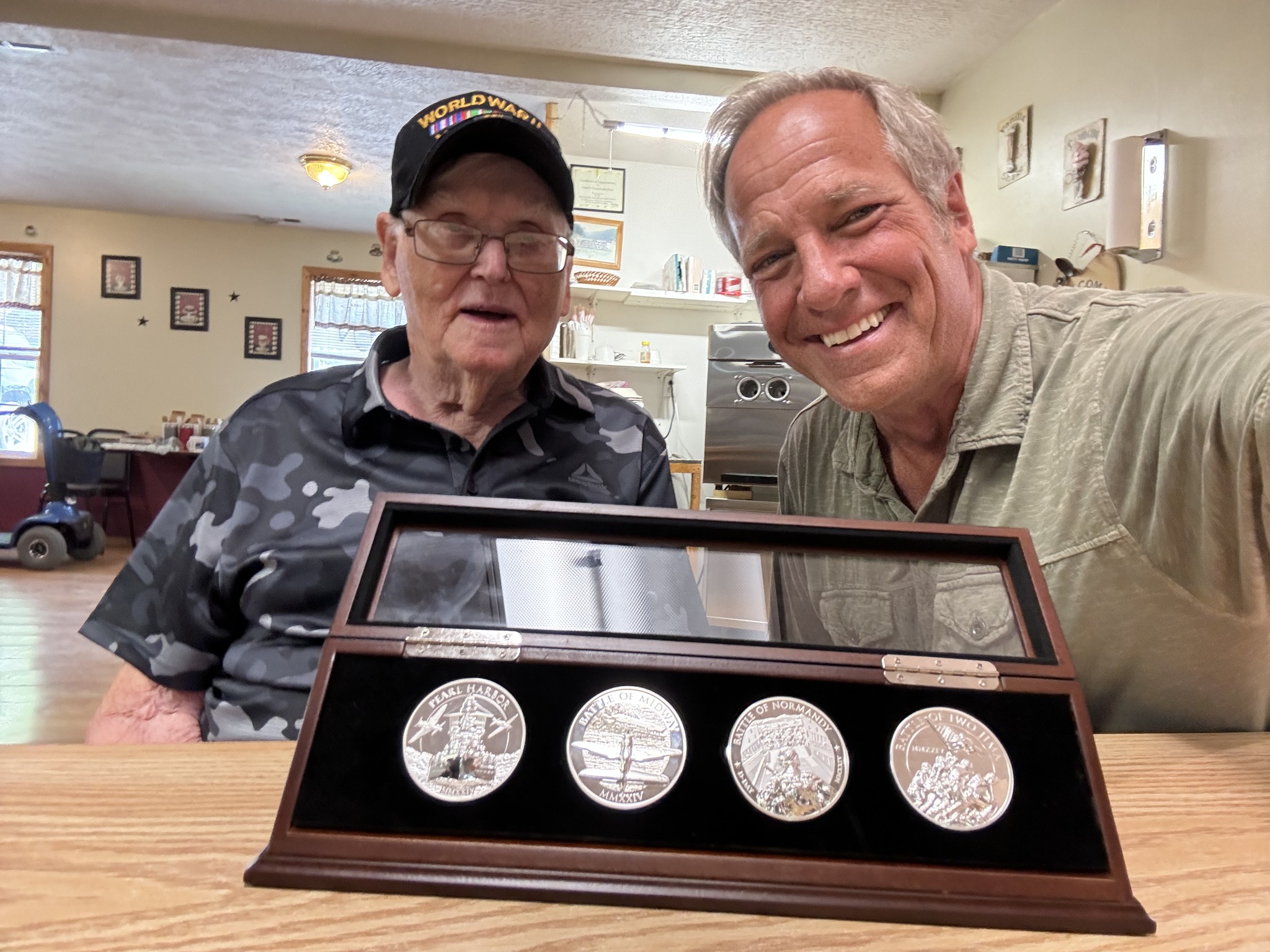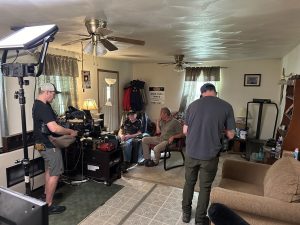
US Money Reserve has a collection of 5-ounce solid silver coins that commemorate four pivotal battles in WWII. Specifically, Midway, Normandy, Iwo Jima, and Pearl Harbor, (although one could argue, I suppose, that Pearl Harbor wasn’t really a “battle.”)
The coins are part of USMR’s Valor and Victory series, and the CEO recently asked me if I’d like to present a few of these collections to some brave men who fought in that terrible war, all those years ago. Given the fact that so few of the Greatest Generation remain, I thought about it for maybe half a second before saying, “Hell, yes!”
Our first recipient was Charles Bird, who currently resides in Clay County, West Virginia, in the little town of Lizemores. I caught up with Mr. Bird last Wednesday in his modest living room. He was waiting for me behind the Ham Radio set-up, where he chats every morning with friends all over the country.
“It keeps me connected,” he told me. “The voices are such good company.”
Corporal Bird introduced me to a few of those voices, as my crew recorded everything. Rick in Ohio, was particularly talkative, and spoke in very flattering terms about Mr. Bird, who blushed beside me.
“Birdy,” as many call him, recently made the local press, when he graduated from high school at the tender age of 99, alongside Ashdon, his great-granddaughter. He would have done so 75 years before, but the Japanese had other plans, and after Pearl Harbor, Birdy answered the call, leaving high school early, along with his job in the coal mines. He landed in Normandy on D-Day +46, and worked as a jeep driver in England, France, Netherlands, Belgium, Luxemburg, Czechoslovakia, and Germany. He was there for The Battle of the Bulge and saw some things he’d prefer not to discuss. He was also among those who occupied Hitler’s Hideout in Berchtesgaden – the Eagle’s Nest – for three months. He saw some things there, too, and if you saw Band of Brothers, you have a pretty good idea what those things were. In fact, Birdy showed me a piece of Hitler’s oriental carpet, which he kept as a souvenir. 
“Son-of-gun probably stood right here,” he said. “Before his plans went all to hell.”
When Birdy came home, he went to back work in the coal mines, and stayed there for the next forty years. He started shoveling coal on his knees because there was no room to stand up. He had to crawl to get anywhere, holding his dinner bucket between his teeth. From there he worked his way up to running the coal feed, and then worked as a cleaner in the coal tipple. In all that time in the mines, he only broke one finger, along with his nose. To this day, he still pays his dues to the United Mine Workers of America every month, and just received his 80-year pin.
“What was that like?” I asked. “To be honored that way.”
Birdy shrugged. “Well, they had to make a special pin,” he said. “Nobody ever lasted that long.”
“Must have been tough,” I said. “Working underground all those years.”
Birdy nodded. “A bit like combat,” he said. “You never knew if you were gonna make it home.”
“Any regrets?” I asked.
Birdy stared out the window at nothing in particular for a minute or so.
 “A man will do whatever he has to do to take care of his family,” he said. “I took care of mine.”
“A man will do whatever he has to do to take care of his family,” he said. “I took care of mine.”
We chatted some more about his time in the mines, and about his time in Europe, which I’ll share here when we get the video together. Then we took a ride to a local restaurant, where I met his family and presented him with the World War II Valor and Victory collection. He seemed very touched. In fact, he might have wept a little. And he might not have been the only one.
What struck me most about Birdy, and so many of the other combat veterans I’ve had the pleasure of meeting and talking with over the years, is their modesty. Real valor comes with a measure of genuine humility, and guys like Birdy always go out of their way to accept the praise people wish to heap upon them. They’re always quick to downplay their own contributions, and even quicker to credit the people around them as more deserving of the recognition they so clearly deserve. Which is of course, precisely why they should be celebrated in this life, and remembered for generations to come.
Next week, I’ll tell you about another 99-year-old soldier I just met, whose valor deserves to be recognized. His name is George, and you’re gonna like him, too.
I guarantee it.
Mike’s Facebook Page
